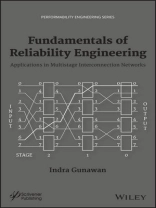Provides fundamentals of reliability engineering and illustrates practical applications in the area of parallel/distributed systems (Multistage Interconnection Networks)
The first part of the book (chapters 1-5) introduces the concept of reliability engineering, elements of probability theory, probability distributions, availability, and data analysis. The second part of the book (chapters 6-11) provides an overview of parallel/distributed computing, network design considerations, classification of multistage interconnection networks, network reliability evaluation methods, and reliability analysis of multistage interconnection networks including reliability prediction of distributed systems using Monte Carlo method.
Fundamentals of Reliability Engineering meets the increasing demand for knowledge tools that practicing reliability professionals can use to optimize their reliability decisions. Reliability prediction is important as it determines the usability and efficiency of the network to provide services. Reliability evaluation methods discussed in this book can be applied to analyze the reliability of any other systems. As an example, reliability analysis of distributed systems that consist of layers of switching elements connected together in a predefined topology that provide the connectivity between the set of processors and the set of memory modules, are presented.
Tabella dei contenuti
Preface ix
1 Introduction to Reliability Engineering 1
1.1 The Logic of Certainty 1
1.2 Union (OR) operation 2
1.3 Intersection (AND) operation 3
1.4 Series systems 4
1.5 Parallel systems 5
1.6 General Series-Parallel System 6
1.7 Active Redundancy 6
1.8 Standby Redundancy 7
1.9 Fault Tree Analysis 7
1.10 Minimum Cut Sets and Path Sets 9
References 10
2 Elements of Probability Theory 11
2.1 Basic Rules of Probability 11
2.2 Cumulative Distribution Function 12
2.3 Probability Mass Function 12
2.4 Probability Density Function 12
2.5 Moments 13
2.6 Percentiles 13
References 14
3 Probability Distributions 15
3.1 Binomial 16
3.2 Poisson 17
3.3 Exponential 18
3.4 Weibull 19
3.5 Normal 19
3.6 Lognormal 20
3.7 Mean Time To Failure (MTTF) 22
References 23
4 Availability 25
4.1 Definition 25
4.2 Summary 27
4.3 Availability of Systems with Repair 28
References 29
5 Data Analysis 31
5.1 Theoretical Model and Evidence 31
5.2 Censored Samples 32
5.3 Bayesian Theorem 33
References 35
6 Introduction to Network Systems 37
6.1 Parallel Computing and Networks 38
6.2 Network Design Considerations 41
6.3 Classification of Interconnection Networks 45
References 56
7 Classification of Multistage Interconnection Networks 57
7.1 Background 57
7.2 Multistage Cube Network 67
7.3 Extra-Stage Cube Network 70
7.4 Shuffle-Exchange Network 72
7.5 Shuffle-Exchange Network with an Additional Stage 73
7.6 Gamma Network 75
7.7 Extra-Stage Gamma Network 77
7.8 Dynamic Redundancy Network 78
7.9 Improved Enhanced Augmented Data Manipulator Network 79
7.10 Improved Logical Neighborhood Network 80
7.11 Comparison 81
References 84
8 Network Reliability Evaluation Methods 87
8.1 Overview of Network Reliability 87
8.2 Network Model 88
8.3 Network Operations 89
8.4 Approaches for Calculating Network Reliability 89
8.5 Summary 99
References 100
9 Reliability Analysis of Multistage Interconnection Networks 101
9.1 Reliability Analysis of Shuffle-Exchange Network with Minimal Extra Stages 101
9.2 Terminal Reliability Improvement in Modified Shuffle-Exchange Network 115
9.3 Reliability Bounds for Large MINs 121
References 132
10 Terminal Reliability Assessment of Gamma and Extra-Stage Gamma Networks 133
10.1 Introduction 133
10.2 Gamma Network 135
10.3 Terminal Reliability of Gamma Network 139
10.4 Extra-Stage Gamma Network 140
10.5 Comparison 146
10.6 Conclusions 146
References 147
11 Reliability Prediction of Distributed Systems Using Monte Carlo Method 149
11.1 Introduction 149
11.2 Reliability Parameters 152
11.3 Monte Carlo Method 153
11.4 Confidence Interval for Monte Carlo Point Estimate 155
11.5 Numerical Results 157
11.6 Conclusion 163
References 164
Index 167
Circa l’autore
Indra Gunawan, Ph D, is a Senior Lecturer and Coordinator
of Postgraduate Programs in Maintenance and Reliability Engineering
in the School of Applied Sciences and Engineering at the Federation
University, Australia. He completed his Ph D degree in industrial
engineering from Northeastern University, USA. Prior to joining
Monash University, he served as a faculty member in the Department
of Mechanical and Manufacturing Engineering at Auckland University
of Technology, New Zealand. His main areas of research are
maintenance and reliability engineering, project management,
application of operations research, operations management, applied
statistics, probability modeling, and engineering systems design.
His work has appeared in many peer-reviewed journals and conference
proceedings.












